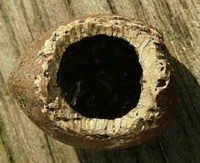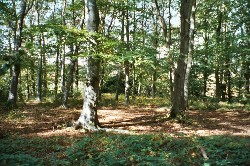TREES and WILDLIFE
Trees as wildlife habitats
Trees can be important for wildlife, especially squirrels, birds, invertebrates, bats, and lichens. Trees give shelter and food. Ancient or veteran trees are especially important. Dead wood can be especially important for invertebrates (and consequently for birds which feed on them). Leave dead wood in the tree if it’s not dangerous, or leave some dead wood and wood from tree surgery as habitat piles for invertebrates and other “minibeasts”.
| Trees can give shelter and food for some of the many plants and animals who make up the Island’s rich and varied wildlife, especially squirrels, birds, insects, birds, bats, and lichens. Trees are especially important in gardens if they form “green corridors” connecting gardens up with each other and with the countryside beyond. |  |
Some trees are wildlife in their own right, since they are native to Britain and indigenous to the Isle of Wight, and made their own way here after the last ice age without human help.
Wildlife protection
Some species and habitats are protected by law under the Wildlife and Countryside Act 1981, and you could be prosecuted for damaging them or instructing somebody else to do so. For example, you should not tell a contractor to remove a tree or to do tree surgery which would destroy shelter for bats, red squirrels, dormice, or nesting birds.
Trees and woods may be legally protected by Tree Preservation Orders (TPOs), made under the Town and Country Planning Act 1990 and the Town and Country Planning (TreePreservation)(England)Regulations 2012 and by temporary planning conditions. You also need to give notice if you want to remove or prune a tree in a Conservation Area, so that the Council can consider whether the tree should be protected by a TPO. For more information see Trees and the Law.
Trees and woods may be legally protected by Tree Preservation Orders (TPOs), made under the Town and Country Planning Act 1990 and the Town and Country Planning (TreePreservation)(England)Regulations 2012 and by temporary planning conditions. You also need to give notice if you want to remove or prune a tree in a Conservation Area, so that the Council can consider whether the tree should be protected by a TPO. For more information see Trees and the Law.
Managing veteran trees
Ancient trees or veteran trees (younger trees which have some of the characteristics of ancient trees) are some of the most important wildlife in Britain, in themselves within the landscape, and for the very special habitat they provide for other wildlife. Ancient trees are often the old pollards in what is still or used to be wood pasture, and have been cut regularly at 6-15' above ground level for regular supplies of fuel and poles. Get advice on managing veteran trees from Natural England.
Managing woods
 | Woods - especially ancient woods - are important habitats. If your garden includes a wood, or part of a wood, it will be better for wildlife if you manage it as a whole habitat - it’s not just a collection of garden trees. Some woods are protected under the Wildlife and Countryside Act 1981. Get professional advice before starting any work. Woods may also be protected by Tree Preservation Orders (see below) – consent must be obtained from the Isle of Wight Council’s Protected Trees Service for any work. |
Under the Forestry Act 1991 if you want to remove more than 5m3 of timber you will need a felling licence - contact the Forestry Commission You may be able to apply for money, a Woodland Improvement Grant, which is designed to help woodland owners manage their woods the Woodland Grant Scheme - contact the Forestry Commission for details.
You may find it helpful to join the Small Woods Association , which is an independent group run by and for small woodlands.
Grants for planting or woodland management
If you have a large garden, and want to plant at least 0.25 ha, you may be able to apply for money from the Woodland Grant Scheme - contact the Forestry Commission for details.
Getting involved
You may want to help groups like Island Conservation Volunteers, Wight Nature Fund, Footprint Trust, or the IWC Countryside Services, when they carry out practical conservation work in woods.
If you want to do more for trees in your area, contact your local parish council or town council or neighbourhood forum to find out who your local Tree Warden is, or to volunteer yourself as a Tree Warden. If your area is not within a parish or town council area, contact the local neighbourhood forum.
Page last updated on: 03/05/2012





